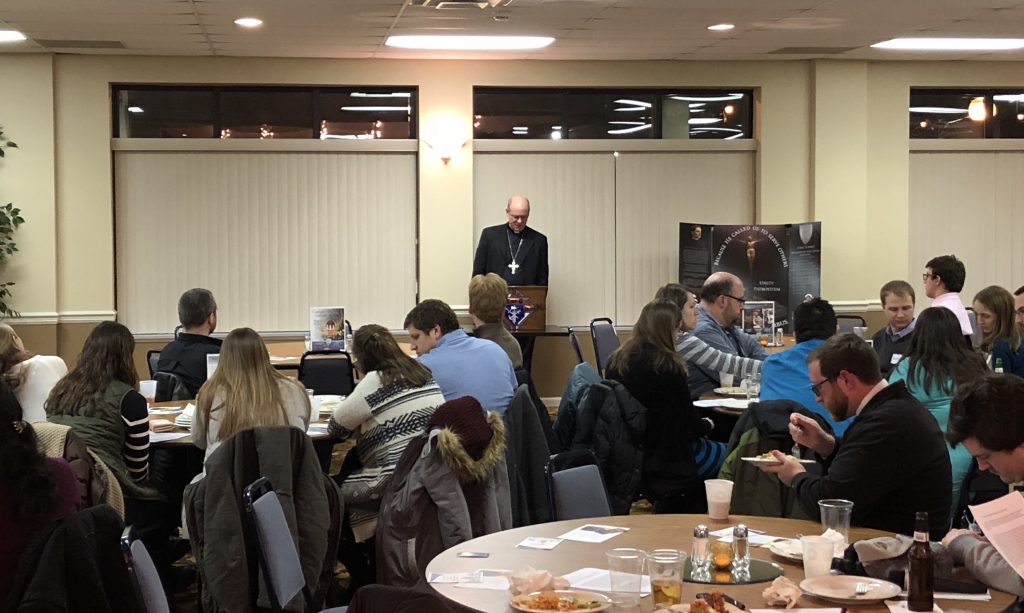January 25, 2018 // Diocese
‘Hope, because we will be victorious through Christ’
Around 100 young adults braved frigid temperatures Tuesday, Jan. 16, to hear Bishop Kevin C. Rhoades speak on a topic many of them are struggling with today: “Darkness and Light: Finding Hope in Hard Times.” Bishop was the speaker at the evening’s Theology on Tap session, which took place at the Knights of Columbus Hall in Mishawaka.
“People get very down because of things going on in the world, and yet as Christians we are called to be a people of hope and to be witnesses of hope,” he said. “That’s why I was happy to speak on this topic. I want to talk about why we are a people of hope, that hope is a virtue, and what it means to have hope.”

Placing hope in the ultimate victory of Christ helps combat despair during bad times, Bishop Kevin C. Rhoades told young adults Jan. 16, when he spoke at the South Bend-area Theology on Tap gathering at the Mishawaka Columbus Hall. — Andrew Mentock
After presenting the cruel and seemingly hopeless events of the life of St. Josephine Bakhita, the bishop acknowledged that there are also many reasons young adults lack hope in today’s world. For some, these include a crisis of faith. Without a strong connection to God, they are unable to face and overcome disparaging situations. Others struggle to comprehend the seemingly heightened suffering that goes on in the world today because of war, terrorism, conflict and natural disasters.
Bishop Rhoades saw Theology on Tap as a great setting to talk about such a difficult topic, he said, since it provides an environment where young adults can feel comfortable, and thus have an open and engaging discussion.
He began his talk with an introduction to the concept of hope and its place in the Catholic Church.
He encouraged the young adult attendees to refer to the Catechism of the Catholic Church when discussing virtues and other faith-related topics. He then gave them the Catechism’s definition of hope: “Hope is the theological virtue by which we desire the kingdom of heaven and eternal life as our happiness, placing our trust in Christ’s promises and relying not on our own strength, but on the help of the grace of the Holy Spirit” (CCC 1817).
“‘Day by day, man experiences many greater or lesser hopes, different in kind according to the different periods of his life,’” he continued, quoting the second encyclical of Pope Benedict XVI, “Spe Salvi,” or “Saved in Hope.” “‘Sometimes one of these hopes may appear to be totally satisfying without any need for other hopes. Young people can have the hope of a great and fully satisfying love; the hope of a certain position in their profession, or of some success that will prove decisive for the rest of their lives. When these hopes are fulfilled, however, it becomes clear that they were not, in reality, the whole. It becomes evident that man has need of a hope that goes further. It becomes clear that only something infinite will suffice for him, something that will always be more than he can ever attain’” (Spe Salvi 30).
Bishop Rhoades invited those present to read the Scriptures in times of turmoil, because there are hardly any disasters happening in today’s world that people in the Bible didn’t experience. Yet many biblical figures, such as Jeremiah, remained hopeful because they trusted in God and His promises. They had God as “their rock and salvation.”This is a much greater outlook than being overly positive, he noted, since optimism is simply believing that things in life will turn out well.
“These great figures didn’t believe that bad things would not happen. Bad things do happen. A person of authentic hope is not compelled to hold that suffering, tragedy, conflict and even the death of innocent people will simply disappear through the intervention of God in this life. Despite all darkness, they had the great hope that in God, life and love would eventually triumph.”
In fact, he continued, people who are only optimistic often fall into the trap of presumption, which is one of the two ways in which people can destroy hope. The other is despair, which can take anyone deep into the darkness.
For those who may fall into either of these traps and slip into the darkness, Bishop Rhoades mentioned three ways to find hope during hard times: prayer, the sacraments and works of love and mercy.
He ended by praying an act of hope to give the young adults in the room something to fall back on when times get tough — although it’s something that everyone can certainly use, he added. “Oh Lord God, I hope by your grace for the pardon of all my sins and, after life, to gain eternal happiness because you have promised it, who is infinitely powerful, faithful, kind, and merciful. In this hope, I intend to live and die. Amen.”
The best news. Delivered to your inbox.
Subscribe to our mailing list today.






